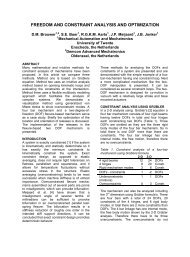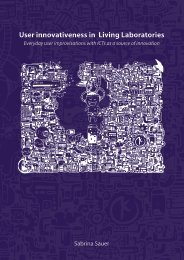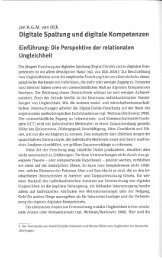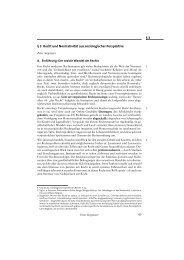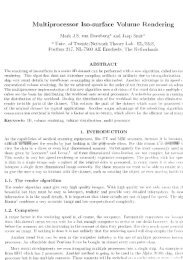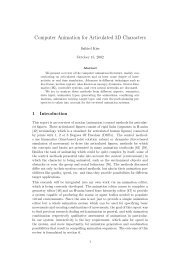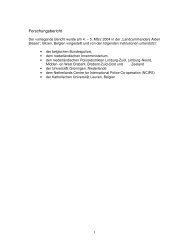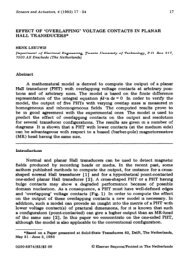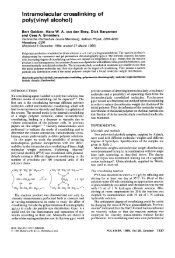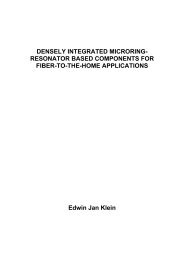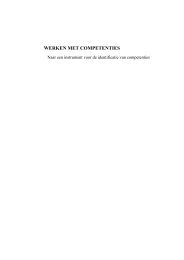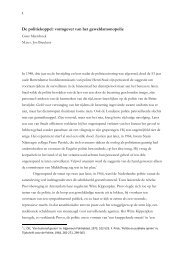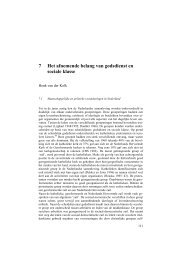- Seite 1:
WAS TUT GUT? LEBENSFREUDE ALS ORIEN
- Seite 4 und 5:
Dit proefschrift is goedgekeurd doo
- Seite 6 und 7:
Maike Keller WAS TUT GUT? LEBENSFRE
- Seite 9:
... die Löcher sind die Hauptsache
- Seite 13 und 14:
DANKSAGUNG Das Zustandekommen einer
- Seite 15 und 16:
EINLEITUNG Panta rhei - alles ist i
- Seite 17 und 18:
entziffern. Das Erkennen eines Wort
- Seite 19 und 20:
Menschenrechte. Allein der Vernunft
- Seite 21 und 22:
menschlicher Natur und gesellschaft
- Seite 23 und 24:
ist die Lebensfreude tief verwurzel
- Seite 25 und 26:
Persönlicher Hintergrund und Relev
- Seite 27 und 28:
I. KAPITEL DER PROTEINCHIP Teil I.
- Seite 29 und 30:
Wechselwirkung zwischen dem Biosens
- Seite 31 und 32:
Krankenhausaufenthalte verursachen.
- Seite 33 und 34:
Aktivität und Interaktion von Prot
- Seite 35 und 36:
heutzutage einen Kapitaleinsatz zwi
- Seite 37 und 38:
Aufgrund der Miniaturisierung könn
- Seite 39 und 40:
Proteinchip in der Praxis eine wese
- Seite 41 und 42:
Der Vergleich mit anderen Technolog
- Seite 43 und 44:
zunächst in RNS und anschließend
- Seite 45 und 46:
Teil II. Der Proteinchip in seiner
- Seite 47 und 48:
sanftmütige Grundverfassung hat -
- Seite 49 und 50:
Die einzige Gewissheit, die ein ges
- Seite 51 und 52:
„Selbstverantwortung“ ist nicht
- Seite 53 und 54:
Wie könnte so etwas konkret aussch
- Seite 55 und 56:
Aspekt der Gesundheitssorge, sei es
- Seite 57 und 58:
9. Die Zielgruppe medizinischen Han
- Seite 59 und 60:
denken, etwa im Sinne einer „phys
- Seite 61 und 62:
Häufig messen sie - in Unkenntnis
- Seite 63 und 64:
zu. Erst im IX. Kapitel kommt der C
- Seite 65 und 66:
der bereits etablierten Magnet - Re
- Seite 67 und 68:
3. Neue Datenorganisationsstrukture
- Seite 69 und 70:
eingesetzt werden und z.B. die Entw
- Seite 71 und 72:
elaborierte Ansätze zur Gewährlei
- Seite 73 und 74:
Zuerst zu den USA. Dort sind die Pr
- Seite 75 und 76:
wünschenswert sind. Würde die Mö
- Seite 77 und 78:
der Sendung durchgeführt. Die Erge
- Seite 79 und 80:
Patienten bedeutungsvollen Informat
- Seite 81 und 82:
Wiederholung nutzen sich die Argume
- Seite 83 und 84:
Grundsätzlich könnten so alte Tra
- Seite 85 und 86:
Teil I. Informationelle Persönlich
- Seite 87 und 88:
Am 25./26.Oktober 2001 wurde ein Re
- Seite 89 und 90:
und das rechte Maß seiner Anwendun
- Seite 91 und 92:
Wenn die Patientin sich dennoch ent
- Seite 93 und 94:
isher und neben dem Grundsatz des i
- Seite 95 und 96:
Psychologisch macht das die Entwick
- Seite 97 und 98:
Der erste hängt damit zusammen, da
- Seite 99 und 100:
hält eine philosophische Neuorient
- Seite 101 und 102:
IV. KAPITEL PHILOSOPHISCHE NEUORIEN
- Seite 103 und 104:
Überlegungen der am Hunter College
- Seite 105 und 106:
Bis zum achtzehnten Jahrhundert dom
- Seite 107 und 108:
durch Loslösung vom konkret Gegebe
- Seite 109 und 110:
V. KAPITEL TECHNOLOGIEREFLEXION AUF
- Seite 111 und 112:
inadäquat im Erfassen menschlicher
- Seite 113 und 114:
Das habe zur Folge, dass erstens di
- Seite 115 und 116:
Hans Achterhuis erläutert in seine
- Seite 117 und 118:
Weise ihren Sinn für das Überlebe
- Seite 119 und 120:
Letztlich geht es beiden darum, and
- Seite 121 und 122:
die humane Existenz hinein. Gerade
- Seite 123 und 124:
estimmten Natur zu sein. Dieser Beg
- Seite 125 und 126:
ist es schwer möglich, unverrückb
- Seite 127 und 128:
VI. KAPITEL DIE FURCHT - EINE VETER
- Seite 129 und 130:
2. Die Ungewissheit der Zukunftspro
- Seite 131 und 132:
erst teilweise analysiert. In Indie
- Seite 133 und 134:
nicht unerhebliche politische Schla
- Seite 135 und 136:
Deshalb muss eine Ethik, die für s
- Seite 137 und 138:
ekommen werden.“ 176 Diese Genera
- Seite 139 und 140:
Deutschland die Rolle erwachsen, di
- Seite 141 und 142:
Als Fazit bleibt fest zu halten, da
- Seite 143 und 144:
zu stellen: Wovor sollen wir uns h
- Seite 145 und 146:
Ich möchte für die Entfaltung des
- Seite 147 und 148:
seinerseits eudaimonia und hedone,
- Seite 149 und 150:
Lebensfreude so wie ich sie versteh
- Seite 151 und 152:
gegebenenfalls zur Erleichterung od
- Seite 153 und 154:
über das Jüdische Gesetz. Nach se
- Seite 155 und 156:
Unfreiheit das Erleben prägen, ent
- Seite 157 und 158:
eindrucksvolles Beispiel einer biop
- Seite 159 und 160:
Wegweiser im Streben nach Glücksel
- Seite 161 und 162:
Basis entzogen wird, ganz unmöglic
- Seite 163 und 164:
ist die Lust, das größtmögliche
- Seite 165 und 166:
eine empirische, auf genaue Beobach
- Seite 167 und 168:
die für einen Philosophen ungewöh
- Seite 169 und 170:
„Wer sein selbst Meister ist und
- Seite 171 und 172:
gewinnen, die im Dickicht des allt
- Seite 173 und 174:
„Lebenskunst ist das, was mich un
- Seite 175 und 176:
IX. KAPITEL DIE BEDEUTUNG DER HEURI
- Seite 177 und 178:
Ausrichtung gibt; zum anderen verwe
- Seite 179 und 180:
Um welche Aspekte also handelt es s
- Seite 181 und 182:
Genügsamkeit Lebens- freude Gesund
- Seite 183 und 184:
physiologischen Nebenwirkungen gibt
- Seite 185 und 186:
anderem weil der Mensch sich der ei
- Seite 187 und 188:
X. KAPITEL DIE HEURISTIK DER LEBENS
- Seite 189 und 190:
verabreichen, und sich darüber hin
- Seite 191 und 192:
Zu Epikurs Zeit standen wenig ander
- Seite 193 und 194:
Spiel. Von seiner ursprünglichen S
- Seite 195 und 196:
Wenn von dem Patienten nicht ausdr
- Seite 197 und 198:
über die Jahrhunderte und die Schu
- Seite 199 und 200:
geleistet wird, in der diese Entsch
- Seite 201 und 202:
handlungsleitende Orientierungen in
- Seite 203 und 204:
Grundsätzlich ist anzunehmen, dass
- Seite 205 und 206:
Seele stiehlt, das bedeutet: Sie ze
- Seite 207 und 208:
Selbstmächtigkeit Genüge zu tun,
- Seite 209 und 210: Statt immer - mehr - desselben zu t
- Seite 211 und 212: persönlichen Sicherheit und Selbst
- Seite 213 und 214: iologisch, soziologisch, psychologi
- Seite 215 und 216: Rahmenbedingungen des Todes. Vielle
- Seite 217 und 218: Handbuch war. Es stellte methodisch
- Seite 219 und 220: Einzelfall bei einem alten und siec
- Seite 221 und 222: Und dann ist es mit der Balance zwi
- Seite 223 und 224: viel zu viele Ressourcen an einen B
- Seite 225 und 226: technisch versierte Handhabung verl
- Seite 227 und 228: Balance als Lebensaufgabe Damit kom
- Seite 229 und 230: XI. KAPITEL DIE BEDEUTUNG DER HEURI
- Seite 231 und 232: AEM könnte etwa folgenden - in Ana
- Seite 233 und 234: technologischen Novität. Und auch
- Seite 235 und 236: ungeahnte Einblicke in die physiolo
- Seite 237 und 238: Endverbraucher so gestaltet, dass s
- Seite 239 und 240: grundsätzlichen Vereinbarung zwisc
- Seite 241 und 242: Damit sind wir am Ende dieses Kapit
- Seite 243 und 244: LITERATURVERZEICHNIS Achterhuis, Ha
- Seite 245 und 246: Marani, E. e.a. production of micro
- Seite 247 und 248: und Nutzung im Rahmen einer individ
- Seite 249 und 250: eine Einführung Stuttgart (u.a.):
- Seite 251 und 252: Microwave Newsletter 1989 ISBN 90 -
- Seite 253 und 254: Swierstra, Tsjalling 2004 Slachtoff
- Seite 255 und 256: "Gesund in eigener Verantwortung" a
- Seite 257 und 258: ichtinggevende leidraad. Ze doen ge
- Seite 259: De auteur reflecteert op de door ha
- Seite 263 und 264: the epicurean art of living would a
- Seite 265: Maike Keller (Jahrgang 1961) Aufgew



